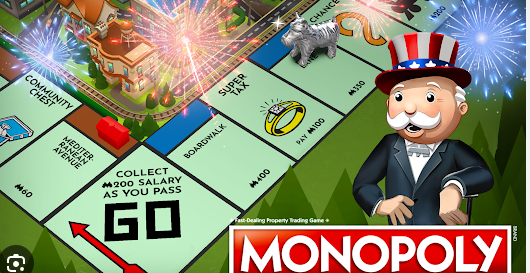Introduction: Monopoly, a classic board game beloved by many, is an engaging pastime that combines strategy, negotiation, and luck. Learning how to navigate the board, buy properties, and manage finances can make for an exciting experience. Here’s a step-by-step guide on how to play Monopoly, ensuring you’re ready to dominate the game board with shrewd decision-making.
Step 1: Setup and Equipment Begin by setting up the game board, placing the board in the center, distributing money to each player, and assigning each player a game piece. Shuffle the Chance and Community Chest cards, place them on their respective spaces, and put all properties face down in their designated areas. Roll the dice to determine who goes first, with the highest roll gaining the initial turn.
Step 2: Starting Your Journey Roll the dice and move your game piece along the board’s outer perimeter, moving the number of spaces indicated by the dice. Land on different spaces, such as properties, Chance, Community Chest, or special areas like Jail, and follow the instructions accordingly.
Step 3: Property Acquisition When you land on an unowned property, you have the option to buy it at the listed price. Purchasing properties is crucial as it allows you to collect rent from other players who land on your owned properties. If you choose not to buy it, an auction takes place, giving other players the chance to bid for the property.
Step 4: Managing Properties After acquiring properties, you can improve them by purchasing houses or hotels. Owning a complete set of properties within a color group enables you to build houses, gradually increasing the rent other players must pay when landing on those properties.
Step 5: Dealing with Chance and Community Chest Landing on these spaces triggers drawing a card that may bring unexpected rewards or penalties, impacting your financial standing or directing your game strategy.
Step 6: Jail and Free Parking Landing in Jail does not halt your play. You can try to roll doubles on your next turn to get out or pay a fine to leave immediately. Free Parking often accumulates fines and taxes paid by players throughout the game, creating a windfall for the lucky player who lands there.
Step 7: Bankruptcy and Conclusion The game continues until players amass properties and wealth, leading opponents to bankruptcy. The last player left standing with financial solvency becomes the victor.
Conclusion: Monopoly remains an enduring classic due to its blend of strategy, luck, and negotiation. Mastering the art of property acquisition, financial management, and strategic decision-making makes for an exhilarating and competitive experience.
Introduction to Monopoly
Monopoly is a classic board game designed to simulate real estate and economic trading. Players roll dice, move around the board, buy and develop properties, and try to bankrupt their opponents to emerge as the wealthiest player.
Step 1: Set Up the Game
- Game Board: Unfold the Monopoly board and place it on a flat surface.
- Tokens: Each player chooses a token (car, hat, dog, etc.).
- Money Distribution: Give each player an equal amount of money (usually $1500).
- Property Cards: Shuffle the property cards and place them in their designated spots on the board.
- Choose a Banker: One player acts as the banker, responsible for transactions, property auctions, and managing the bank’s money.
Step 2: Starting the Game
- Rolling the Dice: The player with the highest roll starts. Roll the dice and move that number of spaces clockwise around the board.
- Buying Properties: When a player lands on an unowned property, they can choose to buy it. If they decline, it goes up for auction.
- Collecting Rent: If a player lands on a property owned by someone else, they pay rent according to the property’s value.
Step 3: Building and Developing
- Property Ownership: To own a complete set of properties in the same color group, a player must purchase all properties in that group.
- Building Houses and Hotels: Players can improve their properties by buying houses and hotels to increase the rent they can charge.
- Mortgaging Properties: In need of cash? Players can mortgage properties to the bank for loans.
Step 4: Chance and Community Chest Cards
- Drawing Cards: When a player lands on the designated spaces, they draw Chance or Community Chest cards, which may bring good or bad luck.
- Following Instructions: Cards might instruct players to collect money, pay fines, or move to different spaces on the board.
Step 5: Jail and Getting Out
- Landing on Jail: Players can land on Jail by rolling doubles three times or by drawing a specific card.
- Paying to Get Out: Players can pay a fine or use a “Get Out of Jail Free” card. Otherwise, they attempt to roll doubles to leave on their next turn.
Step 6: Bankruptcy and Winning
- Bankruptcy: Players can go bankrupt by owing more than they can pay. Their properties and assets are then sold off.
- Last Player Standing: The game continues until all but one player goes bankrupt. The remaining player is declared the winner.
Introduction to Monopoly: Monopoly is a classic board game that involves buying, trading, and developing properties to become the wealthiest player. The game is played with 2 to 8 players and requires strategic thinking, negotiation skills, and a bit of luck.
Setting Up the Game:
- Board Layout: Lay out the Monopoly board, which consists of a square board with spaces representing properties, utilities, chance cards, and more.
- Choose Tokens: Players select their tokens (such as a car, hat, dog, etc.) to represent them on the board.
- Distribution of Money: Each player receives a set amount of money, including $1500 in various denominations of Monopoly money.
Gameplay: 4. Rolling the Dice: Players take turns rolling two six-sided dice and move their token clockwise around the board the number of spaces indicated by the dice roll.
- Property Purchase: When landing on an unowned property, players have the option to buy it. If they decline, the property is auctioned off to the highest bidder.
- Rent and Ownership: If a player lands on a property owned by another player, they must pay rent according to the property’s value. If they own the property themselves, nothing happens.
- Building Houses and Hotels: As players acquire complete sets of properties of the same color, they can start to build houses and eventually hotels, increasing the rent other players must pay when landing on those properties.
- Chance and Community Chest Cards: Landing on these spaces triggers drawing a card that can bring good or bad luck, such as receiving money or paying fees.
Special Spaces: 9. Jail: Players may land in jail, either by rolling doubles three times in a row or by landing on the “Go to Jail” space. They can either pay to get out immediately or try to roll doubles on their turn.
- Free Parking: Some house rules dictate that money collected from certain fines and fees goes to the center of the board, and whoever lands on Free Parking collects this money.
Strategies and Negotiations: 11. Trading Properties: Players can negotiate deals to buy, sell, or trade properties among themselves to complete sets and increase their chances of winning.
- Mortgaging Properties: If players need cash, they can mortgage their properties to the bank to get money but lose out on potential rent until the mortgage is lifted.
- Bankruptcy: If a player can’t afford to pay debts, they’re declared bankrupt and out of the game unless there’s a house rule allowing them to stay in with certain conditions.
Conclusion: Monopoly continues until only one player remains solvent. The game’s winner is the player with the most assets and cash once all other players go bankrupt.
Final Thoughts: Monopoly is a game that combines luck, strategy, and negotiation skills. It’s a classic that has entertained families and friends for decades, fostering friendly competition and strategic thinking.



